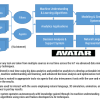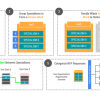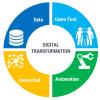Strategic advice to leverage new technologies
Technology is at the heart of nearly every enterprise, enabling new business models and strategies, and serving as the catalyst to industry convergence. Leveraging the right technology can improve business outcomes, providing intelligence and insights that help you make more informed and accurate decisions. From finding patterns in data through data science, to curating relevant insights with data analytics, to the predictive abilities and innumerable applications of AI, to solving challenging business problems with ML, NLP, and knowledge graphs, technology has brought decision-making to a more intelligent level. Keep pace with the technology trends, opportunities, applications, and real-world use cases that will move your organization closer to its transformation and business goals.
Recently Published
In recent years, those using AI to improve software development have focused on creating specialized tools that can aid developers in specific tasks. By combining software development capabilities with an ability to dialog with developers, the new tools are making the development process easier. Indeed, author Donald Reifer believes that in five years’ time, cognitive computing approaches will enable machines to autonomously perform many of the intellectual tasks of software development, and he offers three scenarios for which this might be the case: software requirements definition, test automation, and “roll your own release.”
This issue of Cutter Business Technology Journal is focused on cognitive computing. Cognitive computing is a term that is similar to, but currently more popular than, artificial intelligence (AI), and it refers to all those innovations in computing that are being driven by various types of AI research. Now is the time to start thinking about how to transform your organization with cognitive computing.
Watson Virtual Agent
Watson Virtual Agent is an important development because it aims to streamline the process of implementing intelligent agents and bots.
The Cloud Buyer’s Advantage
Cloud is on everyone’s mind. If you are in the throes of cloud procurement — facing challenges around cost reduction, centralized billing, and agility — then buying indirect offers significant advantages. The objectives of unlocking lower pricing to reduce costs and negotiating suitable procurement terms to improve agility are best achieved by buying cloud indirectly. It is the role of cloud brokers, resellers, and distributors to help customers get the best deal. To negotiate preferred terms as an enterprise cloud buyer, consider buying through an IT distributor or reseller. As we explore in this Executive Update, it is time to start buying cloud as an organization, not as an individual. That means taking a long-term view of how you continually monitor, optimize, and manage the procurement of cloud infrastructure.
Projects are successful when the entire team has the same cohesive vision for the solution. Failure to understand the solution's goal will have rippling effects throughout the project and can lead to failure. It's imperative that the architect and the Agile team members be aligned.
AlphaGo is a major breakthrough in cognitive computing; it is a software application that can successfully play the hardest strategy game that people play and can beat human experts at it.
For enterprises disrupting the marketplace, technology is the key enabler that is helping them create new business models and processes.
The Rise of Data Management in the Cloud, Part II
In Part II of this two-part Executive Update series, we examine the trends, developments, and considerations pertaining to the adoption of self-service business intelligence (BI) environments.















